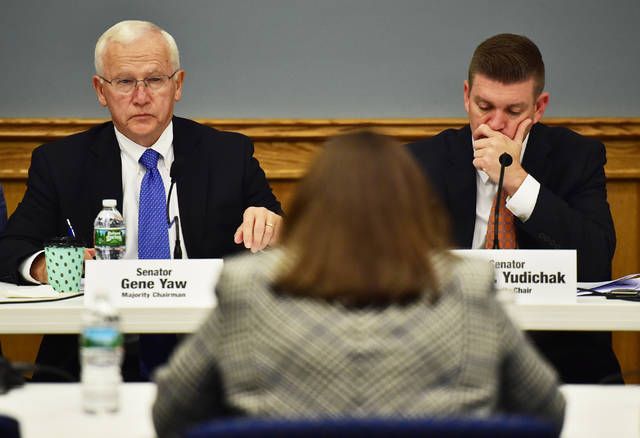Click here to subscribe today or Login.
PITTSTON — Lynn Biga, executive director of the Luzerne County Head Start program, said in the 2016-17 school year, 11 children tested positive for lead in their blood.
So it was with keen interest that Biga attended Monday’s public hearing on lead exposure and mitigation at the Pittston Memorial Library’s John P. Cosgrove Center.
State Sen. John Yudichak, D-Plymouth Township, hosted the hearing of the Senate Environmental Resources and Energy Committee.
The hearing was held to gain a regional perspective from Northeastern Pennsylvania. The Senate Environmental Resources and Energy Committee is chaired by Republican Sen. Gene Yaw and Yudichak.
Those testifying included Lisa Daniels, acting deputy secretary for water programs, Department of Environmental Protection; Dr. Loren Robinson, deputy secretary for health promotion and disease prevention, Department of Health; Jennifer Berrier, director, Bureau of Occupational and Industrial Safety; Michael Lombardo, vice chair, Pittston Redevelopment Authority; Henry Radulski, health director for the City of Wilkes-Barre; Cherie Gudz, vice president, Environment, Health and Safety, SGS; and David Kaufman, vice president, engineering, Pennsylvania American Water.
Biga said the 11 children that tested positive for lead were referred for further testing. She said children can be exposed to lead contained in paint, old piping, or it can be ingested.
“Any level of lead in a child’s blood is cause for concern,” Biga said.
Lombardo, who is running for mayor of Pittston City, said 64 percent of the housing in the city was built before 1940.
“So we have concern about lead,” Lombardo said. “We have to find ways to abate the lead so we can successfully market the city and attract new residents and businesses.”
In opening the hearing, Yaw said, “We have to get to the bottom of where the problems are throughout Pennsylvania and mitigate them.”
Yudichak said he hoped that the hearing would aid the work of the Senate Lead Task Force, that was created by legislation he sponsored — Senate Resolution 33 — which the Senate passed unanimously in June.
SR 33 was created to evaluate lead-related public policies and produce a report in 18 months that will provide direction to the Senate for the development of a more comprehensive lead assessment and remediation strategy for Pennsylvania.
“As the father of four young girls, the topic of lead exposure risks for PA children is of great personal and legislative interest to me,” Yudichak said. “The public health risks to children who can suffer serious, longterm health complications from exposure to lead is well documented and indisputable.”
Yudichak cited some troubling shortcomings in PA’s Lead policies:
• Lead testing is not mandatory for PA children.
• Lead testing in school and daycare water systems are not mandatory.
• There is no dedicated state funding for lead testing or remediation in PA.
Yudichak said the PA Department of Health’s latest survey on lead testing in children found that roughly 28 percent of Luzerne County children under age 2 were tested for lead poisoning. Of the children tested, more than 4 percent had elevated blood levels.
“It’s alarming that more than 70 percent of Luzerne County children are not tested at all for lead exposure,” he said, adding that lead exposure can be a more acute concern in Luzerne County where more than 70 percent of homes and over 85 percent of rental units were built prior to the 1978 federal lead paint ban.
“As a result, communities like Wilkes-Barre are stepping up efforts to monitor its water systems and inspect older housing units,” Yudichak said. “And, communities like Pittston are leading county-wide efforts to address the region’s aging housing infrastructure through a new municipal land bank authority.”
Radulski, Wilkes-Barre’s health director, said there are two risk factors for childhood lead poisoning — housing built before 1978 and children living below the poverty line.
He said according to a 5-year community survey that was completed in 2014, Wilkes-Barre had 19,058 housing units. Of the 19,058 housing units in the city, 12,200, or 64 percent, were built before 1978.
Radulski said a look at the statistics from the U.S. Census Bureau from 2015 shows 32.5 percent of all residents have income below the poverty level.
“That is nearly twice the number of Pennsylvanians who have income below the poverty level,” Radulski said. “Both poverty levels and older housing in Wilkes-Barre have created a perfect storm for childhood lead poisoning.”
Kaufman said PAWC has proposed to the Pennsylvania Public Utility Commission a two-phase replacement plan for lead service lines. Under the proposed plan, PAWC will proactively remove and replace, with the customer’s consent, lead service pipes that are encountered when it replaces its mains and service lines.
Kaufman said PAWC will also remove and replace lead service pipes when requested to do so by a customer, subject to a few conditions.
“Eliminating lead service pipes, together with PAWC’s robust corrosion control water treatment measures and the company’s ongoing efforts to eliminate its remaining lead service lines, are a prudent and effective means to maintain regulatory compliance and protect public health,” Kaufman said.





